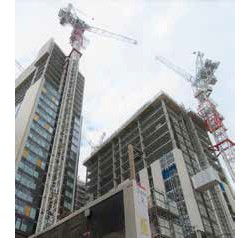Can EXAP and the Golden Thread help the construction industry increase transparency and accountability to secure better building safety? Robert Cridford, Technical Manager for Siniat explains how.
Many questions have been raised since the tragedy of Grenfell Tower. Who was to blame? Did construction professionals cut corners? Why weren't more stringent rules and regulations in place? Ever since the tragedy, the government has been trying to overcome ambiguity by tightening up the fire safety guidance. But what can we as a construction industry do to ensure we are building safely and to the most robust safety standards?
While the government is looking at ways to tighten up regulations, as an industry, we need to take ownership and be proactive in ensuring fire safety, if we are serious are about improving the standards of our buildings. One of the most important ways we can do this is by specifying materials that meet the most robust standards and ensuring that we have adequate testing and classification data, before we even consider using them in a project.
For systems used for fire safety, this means following the guidance in ADB and shifting from testing to BS, or even EN, and moving towards extended field of application (EXAP). EXAP is the standard used to extend a fire test's results to other similar systems and it is now referenced in ADB as the only recognised method of making these extensions or assessments. It requires following a process of 'test, extend and classify'.
This involves testing to the appropriate EN fire testing standard. Next, test data can be extended to similar applications, but only by qualified and approved third-party bodies using the test standard or EXAP – and critically only where the standards explicitly allow it. Finally, this evidence must be validated and summarised in an official third-party classification report.
EXAP is more onerous and demands the extensive additional testing, extension and classification of a manufacturer's entire portfolio of systems. This is a laborious and expensive task and, therefore, required a transitionary period following its initial introduction in 2019. But years down the line, projects that require EXAP should not be proceeding without adequate fire safety data. It is all of our responsibility to check whether a project requires EXAP and ensure that the materials specified have been through the appropriate testing.
We must all hold ourselves accountable. This means that while manufacturers should be providing EXAP reports as standard, specifiers, architects and main contractors must engage with manufacturers early on in the project to confirm whether the project requires EXAP, and if so, request third-party reports. By ensuring a project adheres to the correct standards early on, we can ensure that standards are met, which is the simplest way of ensuring we are building safely.
Another way that we can increase transparency and accountability within the construction industry is through the provision of a Golden Thread of performance data.
By producing a Golden Thread of information and ensuring it is available throughout the lifecycle of a building, industry professionals can prove that buildings meet regulations and that testing standards have been met. In fact, this is expected to become embedded in law within the next few years and will not only impact future projects but will also have a major retrospective impact on existing buildings, too.
If we do not hold ourselves accountable, someone else will. Regulation 38 states that not only organisations can be held responsible, but individuals can be prosecuted too. In fact, any person responsible for inadequate fire safety can be held liable retrospectively for up to 30 years since a build, and 15 years prospectively. On top of this, under the new legislation, residents and homeowners will now have 15 years to claim compensation for substandard work – a significant increase on the previous threshold of six years.
Ultimately, the inclusion of third-party EXAP reports within a building's Golden Thread will provide vital evidence that those involved in a project have worked to the most robust standards. This, in turn, helps to mitigate liability issues, increase transparency and, most importantly, prevents further tragedies from ever happening again.
For more information visit: www.siniat.co.uk/en-gb/uk/exap
Images:
01. Responsibility and accountability for building safety has never been so important









